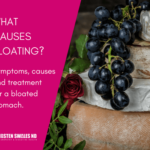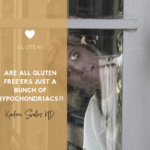Before becoming a Naturopath I had an awareness that more and more people were claiming allergies to anything and everything.
I actually (silently) thought society was turning into a bunch of hypochondriacs. And was even a little judgey about it.
I now believe differently.
Allergies and intolerances are legitimately on the rise.
Our food is so different to what it was 50 years ago.
Our lifestyles are so different to what they were 50 years ago.
Sitting is the new smoking.
We operate in constant go-go-go mode. Time poor and with less understanding of what we should be eating to feel our best. Not for want of trying.
As a result our digestion takes a hit.
Studies are showing that around 75% of people will experience problems with their digestion at some point in their lives. They also show that only 30% of people who experience digestive symptoms will consult their physician about them.
But are the symptoms a result of a food allergy or of a food intolerance?
My video on Facebook yesterday talked about how to tell the difference between the two.
Today I want to share my thoughts on food intolerance tests, and why I advise against relying on them to decide what you should be eating.
First up, most of my clients with digestive issues are usually dealing with some form of IBS (Irritable Bowel Syndrome) with symptoms such as food intolerances for sure, but also bloating, constipation, diarrhoea (or both) and fatigue.
And actually most people with IBS (up to 84% according to research) have SIBO as their underlying cause of their IBS.
If you’re new to me you might not have heard about SIBO.
What’s SIBO?
SIBO is an acronym for Small Intestinal Bacterial Overgrowth.
Most of our digestive bacteria should be hanging out in our large intestine. SIBO occurs when these guys find their way back up into our small intestine.
You can read a more in depth blog post on it here, but in short the main symptoms of SIBO are:
- Bloating within 1-2 hours after eating
- Gas
- Diarrhoea / Constipation / or alternating between the two
- Food intolerances such as gluten, casein, lactose, fructose and more
- Fatigue
- Nutrient deficiencies
- Chronic illnesses such as fibromyalgia, chronic fatigue syndrome, diabetes, neuromuscular disorders and autoimmune diseases.
If you resonate with any of these symptoms I highly recommend getting yourself a test kit and testing for it.
SIBO Testing wins hands down over Food Intolerance testing for usefulness.
And if you do find yourself testing positive for SIBO (like I did) don’t resign yourself to a lifetime of frustrating digestive symptoms, it can be treated.
Consult a practitioner, natural or otherwise, that has a good amount of SIBO know-how to explore what specially designed food plan and herbal anti-bacterials would work best for you.
So why SIBO Testing and not Food Intolerance testing?
A Food Intolerance test may give you the what.
But the results of a SIBO Test can give you the why.
When conducting a food intolerance test, most labs test your blood for IgG (immunoglobulin G) receptions. This measures the amount of food proteins leaked into your blood stream.
But there are simply no studies that prove this to be an accurate measure for food intolerances.
There have been many cases in fact where testers have sent in various samples of their own blood and hair under different names and received completely different results.
Or when they have been tested intolerant to a food they have never even eaten!
Food intolerance test results scrawled over in red, marking the million and one foods you can’t eat are a recipe for for developing nutrients deficiencies, frustration, and eventually disordered eating patterns (again, like I did).
Rather than your body having a bunch of food intolerances, what this most likely indicates is something we call “Leaky Gut Syndrome”.
This condition causes the foods you eat most regularly to leak proteins into your bloodstream and so show up positive as food intolerances when tested this way.
Instead of jumping straight into eliminating these foods from your diet, consult with someone that knows their way around the digestive system to find out which foods you are reacting to and why.
*raises hand, I do distance consultations online*.
When you know the why you can begin to understand what steps you need to take to resolve and how to take them to get to where you want to be with your health. And your life.
I know I really enjoy social nights out eating with friends.
What to do if you think you may have food intolerances?
My first step is one that you can start right now on your own.
Food journals.
Keep a food journal for a few days (5 days at least and ideally including a weekend – our eating patterns are usually a little different on the weekend).
Write down everything that passes your lips…meals, snacks, drinks, everything.
And then also take note of any symptoms you’re having, rating them on a scale of 1-10 in severity.
When it’s down on paper it’s much easier to get a clearer picture of what foods are doing what to your body.
Lots of dairy one day and really congested? That’s likely connected.
Lots of bread and/or pasta and not feeling so mentally sharp? Yeah, that’s a common connection too.
What about a high sugar day and your anxiety levels? I know if I get into the almond croissants (my kryptonite!) I really do feel it emotionally. Which is enough to keep me off them for a while again….
Sometimes it’s not necessarily as clear as that.
So then I recommend getting some help with it.
I can help you to identify things that you might not even know about yet.
FODMAPs.
What the heck are they? Pretty much different, highly fermentable, carbohydrate groups that can cause a lot of bloating….
The Nightshade family.
What family? These guys often cause eczema symptoms in sensitive individuals. Includes tomatoes, capsicums and eggplant…
High histamine foods.
Hista-what? High histamine foods are often the culprit for hives. And rashes. And inflammation. And anxiety. And headaches and insomnia. Lots of the aged and fermented foods tend to be high in histamine.
Confused?
Understandable.
Say no to faulty food intolerance testing and yes to finding balance the natural way.
Start with your own food journal and don’t be scared to reach out if you’d like some help.





